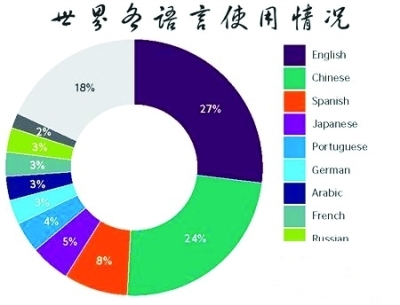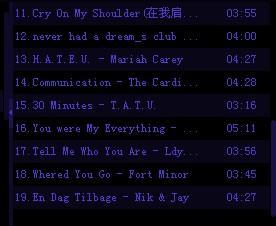当今英语已经成为世界上使用最广泛的语言了。在不是以英语为母语或官方语言的国家里,很多人即使不能熟练地使用英语,也都多少懂点儿英语。无疑,如果你不懂英语,学好英语将会为你的学习、工作等带来很大的帮助。当然,很多人在学习了英语之后,还想掌握一门第二外语。就以汉语为母语的人来说,法语、德语、日语、俄语、西班牙语、阿拉伯语等,学哪种语言最好呢?
如果是为了去留学、工作等特定的原因,那这个问题一点儿也不纠结。你必须要融入那个去学习和工作的言语社团,因此你必须学会那个言语社团所使用的语言。这一点很重要。除去这种原因外,我认为学习哪种二外,最重要的是取决于你对该语言背后的文化是否感兴趣?印地语、马来语、印尼语、孟加拉语等语言都是使用人数超过1亿的大语言,但却很少有人会将它们当作第二外语来学习,除非你对他们的文化感兴趣。
《经济学人》杂志最近刊登了一篇Best Language toLearn的文章,兹转载如下。或许我们不同意里面的观点,但至少这篇文章会给我们提供一个探讨“学什么语言最好”这个问题的视角。
Once a mark of the cultured, language-learning is inretreat among English speakers. It’s never too late, but where tostart? Robert Lane Greene launches our latest Big Question...
曾经被作为是有文化人士的标志,学习外语在英语母语群体中正逐渐式微。什么时候开始学习都不算晚,但是从哪里开始呢?罗伯特·雷恩·格林为我们最新的“大问题”系列打头阵……
For language lovers, the facts are grim: Anglophones simplyaren’t learning them any more. In Britain, despite four decades inthe European Union, the number of A-levels taken in French andGerman has fallen by half in the past 20 years, while what was agrowing trend of Spanish-learning has stalled. In America, thenumbers are equally sorry. One factor behind the 9/11 attacks wasthe fact that the CIA lacked the Arabic-speakers who might havetranslated available intelligence. But ten years on, “English only”campaigns appeal more successfully to American patriotism thancampaigns that try to promote language-learning, as if the mostsuccessful language in history were threatened.
对语言爱好者来说,现实是残酷的:英语母语人士基本上都已不再学习外语了。尽管英国加入欧盟已经有40年,剑桥高级水准考试(注:英国高考)中选择法语和德语课程的人数在过去20年里跌了一半。而之前学习西班牙语的热潮也已停滞。在美国,这方面的数字同样令人堪忧。911事件背后的一个因素在于中情局缺少足够懂阿拉伯语的人来翻译一些获取的情报。但是10年之后,“只说英语”的活动比其它试图推广学习外语的活动更受美国人的爱国主义青睐,就好像历史上最成功的语言现在正处于濒危一样。
Why learn a foreign language? After all, the one you already speakif you read this magazine is the world’s most useful and importantlanguage. English is not only the first language of the obviouscountries, it is now the rest of the world’s second language: aJapanese tourist in Sweden or a Turk landing a plane in Spain willalmost always speak English.
为什么要学习一门外语呢?说到底,如果你在读这份杂志,那么你已经掌握了世界上最有用,也是最重要的语言。英语不仅仅在几个显而易见的国家内是第一语言,它现在也是世界上所有其它地方的第二语言:一位在瑞典的日本游客或是一位在西班牙登机的土耳其人几乎逢人讲的就是英语。
Nonetheless, compelling reasons remain for learning otherlanguages. They range from the intellectual to the economical tothe practical. First of all, learning any foreign language helpsyou understand all language better—many
Anglophones first encounter the words “past participle” not in anEnglish class, but in French. Second, there is the culturalbroadening. Literature is always best read in the original.
但是,还是有一些重要的原因督促着我们学习其它语言。这些因素包括求知欲,经济收益还有实用因素。首先,只要学习一门外语,你对所有语言的理解也会增强。很多英语母语者是在法语课,而不是英语课上最先遇到“过去分词”一词。其次,这也会拓宽你的文化视野。文学作品永远是读原版最好。
Poetry and lyrics suffer particularly badly in translation. Andlearning another tongue helps the student grasp another way ofthinking. Though the notion that speakers of different languagesthink differently has been vastly exaggerated and misunderstood,there is a great deal to be learned from discovering what thedifferent cultures call this, that or das oder.
诗歌在翻译时受到的破坏尤为严重。学习多一门语言可以帮助学生掌握另一种思维方式。虽然不同语言使用者的思维方式不同这一点被广泛地夸大和误解了,但是发现学习不同的文化把不同的事物叫作什么还是可以让你学到很多东西。
The practical reasons are just as compelling. In business, if theteam on the other side of the table knows your language but youdon’t know theirs, they almost certainly know more about you andyour company than you do about them and theirs—a bad position tonegotiate from. Many investors in China have made fatally stupiddecisions about companies they could not understand. Diplomacy,war-waging and intelligence work are all weakened by a lack ofcapable linguists. Virtually any career, public or private, isgiven a boost with knowledge of a foreign language.
从实用方面讲,学习外语的好处也很大。在商场上,如果谈判桌对面的队伍理解你的语言,而你不理解他们的语言。那他们对你和你的公司了解几乎肯定会比你对他们的了解更多,在谈判时这可不是什么有利条件。很多中国的投资者在自己不能理解的公司上做出了一些致命的愚蠢决定。外交,战争和情报工作在缺少能干的语言工作者时都会处于劣势。几乎所有的职业,不管是在公共岗位还是私营岗位上,懂得一门外语总是会给你加分。
So which one should you, or your children, learn? If you take aglance at advertisements in New York or A-level options in Britain,an answer seems to leap out: Mandarin. China’s economy continues togrow at a pace that will make it bigger than America’s within twodecades at most. China’s political clout is growing accordingly.Its businessmen are buying up everything from American brands toAfrican minerals to Russian oil rights. If China is the country ofthe future, is Chinese the language of the future?
那么你,或者你的孩子应该学什么语言呢?如果你看看纽约的广告或是英国的剑桥高级水准科目选择,答案似乎显而易见:中文。中国的经济正在持续以高速增长,最多再花20年就会赶上美国。中国的政治影响力也随之增大。中国商人在世界各地采购,从美国商标,到非洲矿物,到俄罗斯石油开采权无所不包。如果中国是未来的大国,那中文是不是也就成了未来的首选语言呢?
Probably not. Remember Japan’s rise? Just as spectacular asChina’s, if on a smaller scale, Japan’s economic growth led many tothink it would take over the world. It was the world’ssecond-largest economy for decades (before falling to third,recently, behind China). So is Japanese the world’s third-mostuseful language? Not even close. If you were to learn ten languagesranked by general usefulness, Japanese would probably not make thelist. And the key reason for Japanese’s limited spread will alsoput the brakes on Chinese.
应该不是的。还记得日本的崛起吗?和中国现在的崛起一样瞩目,可能规模较小一点。日本的经济增长当时让很多人觉得它将要征服世界了。它占据世界第二大经济体宝座长达几十年以(最近,落在中国之后位居第三了)。那么日语是不是世界第三大常用语言呢?差得远呢。如果你为了日常使用要学十种语言,日语可能都排不进名单。日语普及有限有一个关键性原因,它也同样会阻碍中文的普及。
This factor is the Chinese writing system (which Japan borrowed andadapted centuries ago). The learner needs to know at least3,000-4,000 characters to make sense of written Chinese, andthousands more to have a real feel for it. Chinese, with all itstones, is hard enough to speak. But the mammoth feat of memoryrequired to be literate in Mandarin is harder still. It deters mostforeigners from ever mastering the system—and increasingly trips upChinese natives.
那就是中文文字系统(日本的文字就是在几世纪前借鉴并修改了中文文字而形成的)。需要学习3000到4000个汉字才能算是懂得中文文字了,要真正学好还得再学几千个。中文音调让人很难掌握其口语,但是真正难处还是在于学习中文要达到可以阅读的水平需要大量的记忆力。这一文字系统阻碍了大多数外国人真正掌握中文,而且现在越来越多的中文母语者也会被它难倒。
A recent survey reported in the People’s Daily found 84% ofrespondents agreeing that skill in Chinese is declining. If suchgripes are common to most languages, there is something more to itin Chinese. Fewer and fewer native speakers learn to producecharacters in traditional calligraphy. Instead, they write theirlanguage the same way we do—with a computer. And not only that, butthey use the Roman alphabet to produce Chinese characters: type inwo and Chinese language-support software will offer a menu ofcharacters pronounced wo; the user selects the one desired. (Or ifthe user types in wo shi zhongguo ren, “I am Chinese”, the softwaredetects the meaning and picks the right characters.) With less andless need to recall the characters cold, the Chinese are forgettingthem. David Moser, a Sinologist, recalls asking three nativeChinese graduate students at Peking University how to write“sneeze”:
最近《人民日报》发表的一篇调查发现有84%的受访者表示其中文水平在退步。如果说大多数语言都面临这样的问题,中文的问题是特别严重的。越来越少的中文母语者学习以传统的方式书写汉字。他们写文章的方式和我们一样,用电脑。不仅这样,他们也使用罗马字母来打出汉字:键入wo,支持中文的软件会列出一系列发音为wo的汉字,用户可以选择想要的那个。(或者说当用户键入woshi zhongguoren,软件会自动探测到意思,选出合适的汉字,显示“我是中国人”)随着越来越不需要记忆,很多中国人开始遗忘汉字的写法了。汉学家莫大伟曾回忆他问过三个北大的中国研究生怎么写“喷嚏”:
To my surprise, all three of them simply shrugged in sheepishembarrassment. Not one of them could correctly produce thecharacter. Now, Peking University is usually considered the“Harvard of China”. Can you imagine three phd students in Englishat Harvard forgetting how to write the English word “sneeze”? Yetthis state of affairs is by no means uncommon in China.
很让我惊讶,他们都面有难堪,写不出来。北大一般被认为是“中国的哈佛”。你能想象哈佛的三个英语博士生拼不出“sneeze”吗?而且这种情况在中国绝不罕见。
As long as China keeps the character-based system—which willprobably be a long time, thanks to cultural attachment andpractical concerns alike—Chinese is very unlikely to become a trueworld language, an auxiliary language like English, the language aBrazilian chemist will publish papers in, hoping that they will beread in Finland and Canada. By all means, if China is your maininterest, for business or pleasure, learn Chinese. It isfascinating, and learnable—though Moser’s online essay, “WhyChinese is so damn hard,” might discourage the faint of heart andthe short of time.
只要中国还保留汉字系统(因为文化情结以及现实考量,未来很长一段时间内中国都应该会继续使用汉字系统),中文就不太可能成为真正的世界语言,成为像英语那样的工具语言,一种巴西化学家发表论文时使用,希望芬兰和加拿大的人会阅读的语言。当然,如果你对中文感兴趣,不管这种兴趣是出于业务还是消遣,那就学中文吧。中文是一种很迷人的语言,而且是学得会的,虽然莫大伟在网上发表的一篇文章《汉语怎么这么难!》可能会让那些勇气或是时间不够的人望而却步。
But if I was asked what foreign language is the most useful, andgiven no more parameters (where? for what purpose?), my answerwould be French. Whatever you think of France, the language is muchless limited than many people realise.
但是如果我被问到哪门外语最有用,在没有附加条件的情况下(身处何地?学来干吗?),我的答案会是法语。不管你觉得法语怎么样,这门语言没有很多人想得那么局限。
As their empire spun off and they became a medium-sized power afterthe second world war, the French, hoping to maintain some distancefrom America and to make the most of their former possessions,established La Francophonie. This club, bringing together all thecountries with a French-speaking heritage, has 56 members, almost athird of the world’s countries. Hardly any of them are places whereFrench is everyone’s native language. Instead, they includecountries with Francophone minorities (Switzerland, Belgium); thosewhere French is official and widespread among elites (much ofwestern Africa); those where it is not official but still spoken bynearly all educated people (Morocco, Lebanon); and those whereFrench ties remain despite the fading of the language (Vietnam,Cambodia). It even has members with few ties to French or France,like Egypt, that simply want to associate themselves with theprestige of the French-speaking world. Another 19 countries areobserver members.
随着法国帝国的衰灭以及法国在二战后变成了一个中等势力国,法国人希望能和美国保持一定距离,最大程度利用自己之前的殖民地,于是建立了法语圈。这个俱乐部把所有有着说法语传统的国家集合起来,共有56个国家,占当时世界国家的将近三分之一。但是其中几乎没有法语是母语的国家。相反,这些国家包括有着说法语的少数群体的国家(瑞士,比利时);法语是官方语言,在精英阶级中很是流行的国家(摩洛哥,黎巴嫩);还有那些虽然法语影响力已经减弱,但是还是和法国有关联的国家(越南,柬埔寨)。法语圈甚至包括一些几乎和法国以及法语没什么联系的国家,像是埃及。这些国家只是想要和法语国家的优越地位联系起来。还有19个国家以观察国的身份加入该组织。
French ranks only 16th on the list of languages ranked by nativespeakers. But ranked above it are languages like Telegu andJavanese that no one would call world languages. Hindi does noteven unite India. Also in the top 15 are Arabic, Spanish andPortuguese, major languages to be sure, but regionallyconcentrated. If your interest is the Middle East or Islam, by allmeans learn Arabic. If your interest is Latin America, Spanish orPortuguese is the way to go. Or both; learning one makes the secondquite easy.
以母语人数来说,法语在所有语言内只能排到第16位。但是有一些语言,像是泰卢固语和爪洼语,虽然排名在它之上,却没有人会把它们称为世界语言。印度语连印度都团结不了。此外前15名内还有像是阿拉伯语,西班牙语和葡萄牙语,当然这些都是主要语言,但是在使用上很集中于特定区域。如果你对中东或伊斯兰教感兴趣,学阿拉伯语吧。如果你对拉丁美洲感兴趣,就该学西班牙语或葡萄牙语,或者两者都学——学会其中一种会让学另一种变得很容易。
If your interests span the globe, and you’ve read this far, youalready know the most useful global language. But if you wantanother truly global language, there are surprisingly fewcandidates, and for me French is unquestionably top of the list. Itcan enhance your enjoyment of art, history, literature and food,while giving you an important tool in business and a useful one indiplomacy. It has native speakers in every region on earth. Andlest we forget its heartland itself, France attracts more touriststhan any other country—76.8m in 2010, according to the WorldTourism Organisation, leaving America a distant second with 59.7m.Any visit there is greatly enhanced by some grasp of the language.The French are nothing but welcoming when you show them and theircountry respect, and the occasional frost that can greet visitorsmelts when they come out with their first fully formed sentence. Soalthough there are other great languages out there, don’t forget aneasy, common one, with far fewer words to learn than English, thatis almost certainly taught in your town. With French, vous neregretterez rien.
如果你的兴趣遍及全球,而且你已经读到这儿了,你已经会最有用的全球语言了。但是如果你想再学一门全球语言,让人很惊讶的是,可供选择的语言其实不多。对我来说在这些语言中法语毫无疑问是列在榜首的。法语可以增进你对艺术,历史,文学和烹饪的欣赏,同时也让你掌握一项在商界很重要,在外交界很有用的工具。法语母语者遍布地球上每个主要地区。而且我们不要忘了法语的中心地,法国每年吸引的游客超过任何其它国家。根据世界旅游组织2010年游客达7680万。排名第二的美国只有区区5970万。对于法语有一定掌握会给你的法国之行增色不少。如果你表达了你对法国和法国人的尊重,法国人会对你无任欢迎。偶尔法国人会对游客非常冷漠,但是当你说出一句完整的法语句子时,所有的这种冷漠都会消融。所以说虽然有很多其他语言都很不错,不要忘记还有一门简单常用,单词比英语少得多的语言。不管你身在何方,在你住的城镇几乎肯定有地方学习法语。学习法语吧,你不会后悔的。
Robert Lane Greene is a business correspondent for The Economist inNew York and the author of "You Are What you Speak"
作者罗伯特·雷恩·格林是《经济学人》商业版的驻纽约撰稿人,著有《人如其言》。
 爱华网
爱华网



